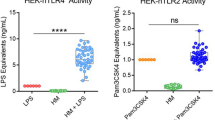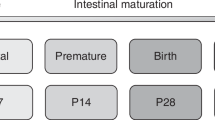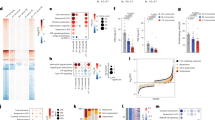Abstract
Intestinal epithelial cells (IEC) are constantly exposed to bacterial components, such as LPS, without triggering proinflammatory immune responses. This study demonstrates that chronic exposure of human-derived IEC to LPS induces tolerance to an endogenous inflammatory cytokine (IL-1β) activated IL-8 response that occurs independently of TLR-4/MD-2 signaling. IL-8 production in response to activation by unrelated TNF-α and PMA signaling pathways is also inhibited, indicating a broad-spanning tolerance. Quantitative rtPCR and IL-8 promoter-luciferase assays demonstrate that tolerance is regulated at the transcriptional level and occurs independently of IEC cytodifferentiation. By contrast, LPS does not significantly alter other proinflammatory signaling cascades in IEC that function independently of IL-8 production, e.g., IL-6 secretion and PEEC (Hepoxilin A3)-induced neutrophil transepithelial migration in response to invasive Salmonella typhimurium. Human IEC have therefore developed LPS-induced signaling cascades that promote an IL-8 hyporesponsiveness to proinflammatory cytokines while LPS exposure does not compromise the ability of IEC to mount other proinflammatory immune responses to invasive enteropathogens.
Similar content being viewed by others
Log in or create a free account to read this content
Gain free access to this article, as well as selected content from this journal and more on nature.com
or
Abbreviations
- DPPIV:
-
dipeptidylpeptidase IV
- fMLP:
-
n-formylmethionyl leucyl phenylalanine
- GI:
-
gastrointestinal
- IEC:
-
intestinal epithelial cell
- IRAK:
-
IL-1R-associated kinase
- LTA:
-
lipoteichoic acid
- PEEC:
-
pathogen-elicited epithelial chemosattractant
- PMN:
-
polymorphonucleocyte
- TLR:
-
toll-like receptor
- tsFHI:
-
temperature sensitive fetal human intestinal epithelial cells
References
Fusunyan RD, Quinn JJ, Ohno Y, MacDermott RP, Sanderson IR 1998 Butyrate enhances interleukin (IL)-8 secretion by intestinal epithelial cells in response to IL-1beta and lipopolysaccharide. Pediatr Res 43: 84–90
Naik S, Kelly EJ, Meijer L, Pettersson S, Sanderson IR 2001 Absence of Toll-like receptor 4 explains endotoxin hyporesponsiveness in human intestinal epithelium. J Pediatr Gastroenterol Nutr 32: 449–453
Abreu MT, Vora P, Faure E, Thomas LS, Arnold ET, Arditi M 2001 Decreased expression of Toll-like receptor-4 and MD-2 correlates with intestinal epithelial cell protection against dysregulated proinflammatory gene expression in response to bacterial lipopolysaccharide. J Immunol 167: 1609–1616
Medzhitov R 2001 Toll-like receptors and innate immunity. Nature Rev Immunol 1: 135–145
Claud EC, Savidge T, Walker WA 2003 Modulation of human intestinal epithelial cell IL-8 secretion by human milk factors. Pediatr Res 53: 419–425
Quaroni A, Beaulieu JF 1997 Cell dynamics and differentiation of conditionally immortalized human intestinal epithelial cells. Gastroenterology 113: 1198–1213
McCormick BA, Colgan SP, Delp-Archer C, Miller SI, Madara JL 1993 Salmonella typhimurium attachment to human intestinal epithelial monolayers: transcellular signaling to subepithelial neutrophils. J Cell Biol 123: 895–907
Zhao D, Keates AC, Kuhnt-Moore S, Moyers MP, Kelly CP, Pothoulakis C 2001 Signal transduction pathways mediating neurotensin-stimulated interleukin-8 expression in human colonocytes. J Biol Chem 276: 44464–44471
Medvedev AE, Kopydlowski KM, Vogel SN 2000 Inhibition of lipopolysaccharide-induced signal transduction in endotoxin-tolerized mouse macrophages: dysregulation of cytokine, chemokine, and toll-Like receptor 2 and 4 gene expression. J Immunol 164: 5564–5574
Sato S, Nomura F, Kawai T, Takeuchi O, Muhlradt PF, Takeda K, Akira S 2000 Synergy and cross-tolerance between toll-like receptor (TLR) 2- and TLR-4 mediated signaling pathways. J Immunol 165: 7096–7101
Lehner MD, Morath S, Michelsen KS, Schumann RR, Hartung T 2001 Induction of cross-tolerance by lipopolysaccharide and highly purified lipoteichoic acid via different Toll-like receptors independent of paracrine mediators. J Immunol 166: 5161–5167
Wang JH, Doyle M, Manning BJ, Di WuQ, Blankson S, Redmond HP 2002 Induction of bacterial lipoprotein tolerance is associated with suppression of toll-like receptor 2 expression. J Biol Chem 277: 36068–36075
Jacinto R, Hartung T, McCall C, Li L 2002 Lipopolysaccharide- and lipoteichoic acid-induced tolerance and cross-tolerance: distinct alterations in IL-1 receptor-associated kinase. J Immunol 168: 6136–6141
Hornef MW, Frisan T, Vandewalle A, Normark S, Richter-Dahlfors A 2002 Toll-like receptor 4 resides in the Golgi apparatus and colocalizes with internalized lipopolysaccharide in intestinal epithelial cells. J Exp Med 195: 559–570
Cario E, Rosenberg IM, Brandwein SL, Beck PL, Reinecker HC, Podolsky DK 2000 Lipopolysaccharide activates distinct signaling pathways in intestinal epithelial cell lines expressing Toll-like receptors. J Immunol 164: 966–972
Cario E, Podolsky DK 2000 Differential alteration in intestinal epithelial cell expression of toll-like receptor 3 (TLR3) and TLR4 in inflammatory bowel disease. Infect Immun 68: 7010–7017
Cario E, Brown D, McKee M, Lynch-Devaney K, Gerken G, Podolsky DK 2002 Commensal-associated molecular patterns induce selective toll-like receptor-trafficking from apical membrane to cytoplasmic compartments in polarized intestinal epithelium. Am J Pathol 160: 165–173
Bocker U, Schottelius A, Watson JM, Holt L, Licato LL, Brenner DA, Sartor RB, Jobin C 2000 Cellular differentiation causes a selective down-regulation of interleukin (IL)-1β-mediated NFκB activation and IL-8 gene expression in intestinal epithelial cells. J Biol Chem 275: 12207–12213
Nanthakumar NN, Fusunyan RD, Sanderson I, Walker WA 2000 Inflammation in the developing human intestine: a possible pathophysiologic contribution to necrotizing enterocolitis. Proc Natl Acad Sci 97: 6043–6048
Fusunyan RD, Nanthakumar NN, Baldeon ME, Walker WA 2001 Evidence for an innate immune response in the immature human intestine: toll-Like receptors on fetal enterocytes. Pediatr Res 49: 589–593
Lipkin M 1987 Proliferation and differentiation of normal and diseased gastrointestinal cells. In: Johnson LR (ed) Physiology of the Gastrointestinal Tract, Raven Press, New York, pp 255–284
Mrsny RJ, Gewirtz AT, Siccardi D, Savidge T, Hurley BP, Madara JL, McCormick BA 2004 Identification of hepoxilin A3 in inflammatory events: a required role in neutrophil migration across intestinal epithelia. Proc Natl Acad Sci 101: 7421–7426
Mizel SB, Snipes JA 2002 Gram-negative flagellin-induced self-tolerance is associated with a block in interleukin-1 receptor-associated kinase release from toll-like receptor 5. J Biol Chem 277: 22414–22420
Ferlito M, Romanenko OG, Ashton S, Squadrito F, Halushka PV, Cook JA 2001 Effect of cross-tolerance between endotoxin and TNF-alpha or IL-1beta on cellular signaling and mediator production. J Leukoc Biol 70: 821–829
Dobrovolskaia MA, Medvedev AE, Thomas KE, Cuesta N, Toshchakov V, Ren T, Cody MJ, Michalek SM, Rice NR, Vogel SN 2003 Induction of in vitro reprogramming by Toll-like receptor (TLR)2 and TLR4 agonists in murine macrophages: effects of TLR “homotolerance” versus “heterotolerance” on NF-kappa B signaling pathways components. J Immunol 170: 508–519
Medvedev AE, Henneke P, Schromm A, Lien E, Ingalls R, Fenton MJ, Golenbock DT, Vogel SN 2001 Induction of tolerance to lipopolysaccharide and mycobacterial components in Chinese hamster ovary/CD14 cells is not affected by overexpression of Toll-like Receptors 2 or 4. J. Immunol 167: 2257–2267
Otte JM, Cario E, Podolsky DK 2004 Mechanisms of cross hyporesponsiveness to Toll-like receptor bacterial ligands in intestinal epithelial cells. Gastroenteorlogy 126: 1054–1070
Yan F, Polk DB 2002 Probiotic bacterium prevents cytokine-induced apoptosis in intestinal epithelial cells. J Biol Chem 277: 50959–50965
Schroeder TH, Lee MM, Yacono PW, Cannon CL, Gerceker AA, Golan DE, Pier GB 2002 CFTR is a pattern recognition molecule that extracts Pseudomonas aeruginosa LPS from the outer membrane into epithelial cells and activates NFκB translocation. Proc Natl Acad Sci 99: 6907–6912
Lemjabbar H, Basbaum C 2002 Platlet-activating factor receptor and ADAM10 mediate responses to Staphylococcus aureus in epithelial cells. Nat Med 8: 41–46
Girardin SE, Boneca IG, Carneiro LA, Antignac A, Jehanno M, Viala J, Tedin K, Taha MK, Labigne A, Zathringer U, Coyle AJ, DiStefano PS, Bertin J, Sansonetti PJ, Philpott DJ 2003 Nod1 detects a unique muropeptide from gram-negative bacterial peptidoglycan. Science 300: 1584–1587
Acknowledgements
The authors thank Dr. B. Cherayil for helpful discussion and critical reviewing of this manuscript and Dr A. Keates for providing IL-8 promoter constructs.
Author information
Authors and Affiliations
Corresponding author
Additional information
This study is supported by grants from the Crohn's and Colitis Foundation and the National Institutes of Health (RO1 DK70260; R37 HD12437; PO1 DK33506; P30 DK40561)
Rights and permissions
About this article
Cite this article
Savidge, T., Newman, P., Pan, WH. et al. Lipopolysaccharide-Induced Human Enterocyte Tolerance to Cytokine-Mediated Interleukin-8 Production May Occur Independently of TLR-4/MD-2 Signaling. Pediatr Res 59, 89–95 (2006). https://doi.org/10.1203/01.pdr.0000195101.74184.e3
Received:
Accepted:
Issue date:
DOI: https://doi.org/10.1203/01.pdr.0000195101.74184.e3
This article is cited by
-
Dietary AGEs involvement in colonic inflammation and cancer: insights from an in vitro enterocyte model
Scientific Reports (2020)
-
Acute drop in blood monocyte count differentiates NEC from other causes of feeding intolerance
Journal of Perinatology (2014)
-
Endotoxin Tolerance Induced by Lipopolysaccharides Derived from Porphyromonas gingivalis and Escherichia coli: Alternations in Toll-Like Receptor 2 and 4 Signaling Pathway
Inflammation (2014)
-
Potential of immunomodulatory agents for prevention and treatment of neonatal sepsis
Journal of Perinatology (2009)
-
Inflammatory bowel disease: past, present, and future
Journal of Gastroenterology (2007)



